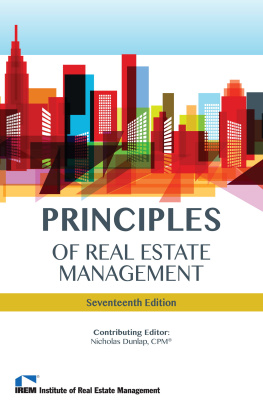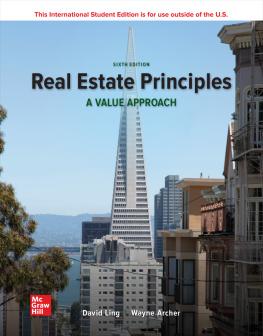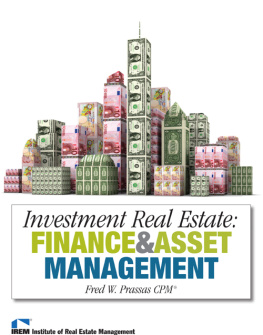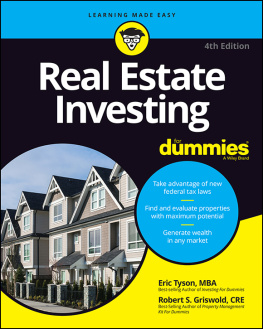Douglas S. Kennedy, J.D., SPHR
Christopher E. Mellen, CPM, ARM
Julie L. Muir, CPM
PRINCIPLES OF REAL
ESTATE MANAGEMENT
SIXTEENTH EDITION

2011 by the Institute of Real Estate Management
of the NATIONAL ASSOCIATION OF REALTORS
All rights reserved. This book or any part thereof may not be reproduced, stored in a retrieval system, or transmitted, in any form or by any means, electronic, mechanical, photocopying, recording, or otherwise, without the prior written permission of the publisher. Inquiries should be directed to Publishing Department, Institute of Real Estate Management, 430 North Michigan Avenue, Chicago, IL 60611.
This publication is designed to provide accurate and authoritative information in regard to the subject matter covered. Forms or other documents included in this book are intended as samples only. Because of changing and varying state and local laws, competent professional advice should be sought prior to the use of any document, form, exhibit, or the like.
This publication is sold with the understanding that the publisher is not engaged in rendering legal, accounting, or any other professional service. If legal advice or other expert assistance is required, the services of a competent professional should be sought.
The opinions expressed in this text are those of the author and do not necessarily reflect the policies and positions of the Institute of Real Estate Management.
Sarah Tilotta Photography
Text and Cover Composition:
Nadia Geagea Pupa
Editor, Education Publishing
Library of Congress Cataloging-in-Publication Data
Principles of real estate management.16th ed.
p. cm.
Includes index.
ISBN-13: 978-1-57203-167-8 (hbk. : alk. paper)
ISBN-10: 1-57203-167-0 (hbk. : alk. paper)
ISBN: 978-1-57203-205-7 (ebook)
1. Real estate management. I. Institute of Real Estate Management.
HD1394.P74 2011
333.33068dc22
2011009525
Printed in the United States of America
PREFACE
Real estate management as a career is a relative newcomer when compared to more traditional careers such as doctors, bankers, teachers, etc. Even so, the real estate manager in todays global marketplace has evolved in a relatively short period of time. Real estate management as a whole is a highly sought after career path for many todayproducing countless experts who are able to master any challenge that comes their way.
In volatile markets, owners, investors, developers, and employers seek only the highly skilled, ethical manager to help guide them through periods of crisis and identify the plan that would prove the most advantageous for that ownership entity. Regardless, quality management from an expert real estate manager can be the catalyst in attaining a higher value or preventing a property from falling into foreclosure.
Principles of Real Estate Management , 16th edition, is re-mastered to introduce readers to the world of real estate management. This textbook describes in great detail exactly what real estate management is and how it came to be, while focusing on the ultimate outcome of real estate managementenhancing the value for investors.
From single-family residences, assisted-living facilities, to vacation rentals, any type of real estate is an opportunity for management. High-rise office towers, neighborhood convenience stores, industrial warehouses, or even super-regional shopping malls are all are owned by someone who must find a way to properly maintain the physical asset so that it increases in valueand the investors return on their investment.
Simply maintaining the physical asset however, is not enough. In order to increase value, you must first increase revenue, which means acquiring specialized training in leasing and marketing, tenant relations and retention, accounting and budgeting, and developing a professional management plan. Developing ways to increase value are also outlined in this book, which includes everything from employee recruitment, training and retention, working with outside contractors or service providers, preventative maintenance, capital improvements, controlling energy consumption, and various other cost-saving measures.
Principles of Real Estate Management , 16th edition, provides the information necessary to solve basic ownership issues, as well as extremely complex matters such as re-tenanting a building, identifying highest and best use of a property contributing to urban renewal of entire neighborhoods or towns. As the worlds population ages, there will be a greater need for specialization of management services. This textbook identifies these specialty disciplines and unique characteristics. Whether your specialty is residential or commercial (office buildings and shopping centers), you will find a comprehensive overview of each property type from start to finish.
Sponsored by the Institute of Real Estate Management (IREM), Principles of Real Estate Management , 16th edition, is a culmination of the ideas and perspectives of long-standing, respected leaders in the industry. With over 18,000 members worldwide, IREM is the first choice of real estate owners, investors, managers, and their companies for education and knowledge for the real estate management industry. The only association to provide a designation, C ERTIFIED P ROPERTY M ANAGER (CPM), that is applicable to managers of every property type, IREMs education programs enable real estate managers to obtain the knowledge for all of the principles outlined in this book. Additional certification programs include the A CCREDITED R ESIDENTIAL M ANAGER (ARM), A CCREDITED C OMMERCIAL M ANAGER (ACoM), and the A CCREDITED M ANAGEMENT O RGANIZATION (AMO)each of which carries name recognition and prestige along with the instant awareness of highly trained and skilled managers.
Julie L. Muir, CPM
ACKNOWLEDGEMENTS
The Institute of Real Estate Management gratefully acknowledges the contribution of the following editorial reviewers for the sixteenth edition of Principles of Real Estate Management , Douglas S. Kennedy, J.D., SPHR, Kathy McKenna-Harmon, CPM, Christopher E. Mellen, CPM, ARM, and Julie L. Muir, CPM. These seasoned professionals provided a peer review of the entire manuscript for accuracy of information, timeliness of content, and ease of reading.
The Institute also thanks Julie L. Muir, CPM for her outstanding and careful review of this book, along with her written contributions to the first two Chapters. Her assistance and dedication to the sixteenth edition is deeply appreciated and invaluable to the Institute.
The Institute of Real Estate Management acknowledges its gratitude to James C. Downs, (19051980). One of the founders of the Institute of Real Estate Management in 1933, he was the first property manager to receive the C ERTIFIED P ROPERTY M ANAGER (CPM) designation. Mr. Downs firmly believed that the best means of developing qualified real estate managers is to teach them specific skills. As a starting point, he wrote the first edition of Principles of Real Estate Management , published in 1947. He revised the book through its twelfth edition in 1980.
PRINCIPLES OF REAL
ESTATE MANAGEMENT
SIXTEENTH EDITION
CHAPTER 1
An Overview of Real Estate Management
By Julie L. Muir, CPM













